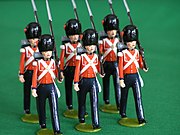
Entertainment
Entertainment is a form of activity that holds the attention and interest of an audience or gives pleasure and delight. It can be an idea or a task, but it is more likely to be one of the activities or events that have developed over thousands of years specifically for the purpose of keeping an audience's attention.
"General entertainment" redirects here. For the television channel format, see Generalist channel. For other uses, see Entertainment (disambiguation).
Although people's attention is held by different things because individuals have different preferences, most forms of entertainment are recognisable and familiar. Storytelling, music, drama, dance, and different kinds of performance exist in all cultures, were supported in royal courts, and developed into sophisticated forms over time, becoming available to all citizens. The process has been accelerated in modern times by an entertainment industry that records and sells entertainment products. Entertainment evolves and can be adapted to suit any scale, ranging from an individual who chooses private entertainment from a now enormous array of pre-recorded products, to a banquet adapted for two, to any size or type of party with appropriate music and dance, to performances intended for thousands, and even for a global audience.
The experience of being entertained has come to be strongly associated with amusement, so that one common understanding of the idea is fun and laughter, although many entertainments have a serious purpose. This may be the case in various forms of ceremony, celebration, religious festival, or satire, for example. Hence, there is the possibility that what appears to be entertainment may also be a means of achieving insight or intellectual growth.
An important aspect of entertainment is the audience, which turns a private recreation or leisure activity into entertainment. The audience may have a passive role, as in the case of people watching a play, opera, television show, or film; or the audience role may be active, as in the case of games, where the participant and audience roles may be routinely reversed. Entertainment can be public or private, involving formal, scripted performances, as in the case of theatre or concerts, or unscripted and spontaneous, as in the case of children's games. Most forms of entertainment have persisted over many centuries, evolving due to changes in culture, technology, and fashion, as with stage magic. Films and video games, although they use newer media, continue to tell stories, present drama, and play music. Festivals devoted to music, film, or dance allow audiences to be entertained over a number of consecutive days.
Some entertainment, such as public executions, is now illegal in most countries. Activities such as fencing or archery, once used in hunting or war, have become spectator sports. In the same way, other activities, such as cooking, have developed into performances among professionals, staged as global competitions, and then broadcast for entertainment. What is entertainment for one group or individual may be regarded as work or an act of cruelty by another.
The familiar forms of entertainment have the capacity to cross over into different media and have demonstrated a seemingly unlimited potential for creative remix. This has ensured the continuity and longevity of many themes, images, and structures.
Etymology[edit]
The Oxford English Dictionary gives Latin and French origins for the word "entertain", including inter (among) + tenir (to hold) as derivations, giving translations of "to hold mutually" or "to hold intertwined" and "to engage, keep occupied, the attention, thoughts, or time (of a person)". It also provides words like "merry-making", "pleasure", and "delight", as well as "to receive as a guest and show hospitality to". It cites a 1490 usage by William Caxton.[1]
Psychology and philosophy[edit]
Entertainment can be distinguished from other activities such as education and marketing even though they have learned how to use the appeal of entertainment to achieve their different goals. Sometimes entertainment can be a mixture for both. The importance and impact of entertainment is recognised by scholars[2][3] and its increasing sophistication has influenced practices in other fields such as museology.[4][5]
Psychologists say the function of media entertainment is "the attainment of gratification".[6] No other results or measurable benefits are usually expected from it (except perhaps the final score in a sporting entertainment). This is in contrast to education (which is designed with the purpose of developing understanding or helping people to learn) and marketing (which aims to encourage people to purchase commercial products). However, the distinctions become blurred when education seeks to be more "entertaining" and entertainment or marketing seek to be more "educational". Such mixtures are often known by the neologisms "edutainment" or "infotainment". The psychology of entertainment as well as of learning has been applied to all these fields.[7] Some education-entertainment is a serious attempt to combine the best features of the two.[8][9] Some people are entertained by others' pain or the idea of their unhappiness (schadenfreude).[10]
An entertainment might go beyond gratification and produce some insight in its audience. Entertainment may skilfully consider universal philosophical questions such as: "What does it mean to be human?"; "What is the right thing to do?"; or "How do I know what I know?". "The meaning of life", for example, is the subject in a wide range of entertainment forms, including film, music and literature. Questions such as these drive many narratives and dramas, whether they are presented in the form of a story, film, play, poem, book, dance, comic, or game. Dramatic examples include Shakespeare's influential play Hamlet, whose hero articulates these concerns in poetry; and films, such as The Matrix, which explores the nature of knowledge[11] and was released worldwide.[12] Novels give great scope for investigating these themes while they entertain their readers.[13] An example of a creative work that considers philosophical questions so entertainingly that it has been presented in a very wide range of forms is The Hitchhiker's Guide to the Galaxy. Originally a radio comedy, this story became so popular that it has also appeared as a novel, film, television series, stage show, comic, audiobook, LP record, adventure game and online game, its ideas became popular references (see Phrases from The Hitchhiker's Guide to the Galaxy) and has been translated into many languages.[14] Its themes encompass the meaning of life, as well as "the ethics of entertainment, artificial intelligence, multiple worlds, God, and philosophical method".[15]
Children's entertainment is centred on play and is significant for their growth. It often mimics adult activities, such as watching performances (on television); prepares them for adult responsibilities, such as child rearing or social interaction (through dolls, pets and group games); or develops skills such as motor skills (such as a game of marbles), needed for sports and music. In the modern day, it often involves sedentary engagement with television or tablet computer.
Entertainment is also provided to children or taught to them by adults and many activities that appeal to them such as puppets, clowns, pantomimes and cartoons are also enjoyed by adults.[41][42]
Children have always played games. It is accepted that as well as being entertaining, playing games helps children's development. One of the most famous visual accounts of children's games is a painting by Pieter Bruegel the Elder called Children's Games, painted in 1560. It depicts children playing a range of games that presumably were typical of the time. Many of these games, such as marbles, hide-and-seek, blowing soap bubbles and piggyback riding continue to be played.
Most forms of entertainment can be or are modified to suit children's needs and interests. During the 20th century, starting with the often criticised but nonetheless important work of G. Stanley Hall, who "promoted the link between the study of development and the 'new' laboratory psychology",[43] and especially with the work of Jean Piaget, who "saw cognitive development as being analogous to biological development",[44] it became understood that the psychological development of children occurs in stages and that their capacities differ from adults. Hence, stories and activities, whether in books, film, or video games were developed specifically for child audiences. Countries have responded to the special needs of children and the rise of digital entertainment by developing systems such as television content rating systems, to guide the public and the entertainment industry.
In the 21st century, as with adult products, much entertainment is available for children on the internet for private use. This constitutes a significant change from earlier times. The amount of time expended by children indoors on screen-based entertainment and the "remarkable collapse of children's engagement with nature" has drawn criticism for its negative effects on imagination, adult cognition and psychological well-being.[45][46][47]
Forms[edit]
Banquets[edit]
Banquets have been a venue for amusement, entertainment or pleasure since ancient times,[48] continuing into the modern era.[49] until the 21st century when they are still being used for many of their original purposes – to impress visitors, especially important ones; to show hospitality; as an occasion to showcase supporting entertainments such as music or dancing, or both. They were an integral part of court entertainments and helped entertainers develop their skills. They are also important components of celebrations such as coronations, weddings, birthdays civic or political achievements, military engagements or victories as well as religious obligations, one of the most famous being the Banqueting House, Whitehall in London.[50][51] In modern times, banquets are available privately, or commercially in restaurants, sometimes combined with a dramatic performance in dinner theatres.[52] Cooking by professional chefs has also become a form of entertainment as part of global competitions such as the Bocuse d'Or.[53]
Safety[edit]
Some entertainments, such as at large festivals (whether religious or secular), concerts, clubs, parties and celebrations, involve big crowds. From earliest times, crowds at an entertainment have associated hazards and dangers, especially when combined with the recreational consumption of intoxicants such as alcohol. The Ancient Greeks had Dionysian Mysteries, for example, and the Romans had Saturnalia. The consequence of excess and crowds can produce breaches of social norms of behaviour, sometimes causing injury or even death, such as for example, at the Altamont Free Concert, an outdoor rock festival. The list of serious incidents at nightclubs includes those caused by crowd crush; terrorism, such as the 2002 Bali bombings that targeted a nightclub; and especially fire. Investigations, such as that carried out in the US after The Station nightclub fire often demonstrate that lessons learned "regarding fire safety in nightclubs" from earlier events such as the Cocoanut Grove fire do "not necessarily result in lasting effective change".[166] Efforts to prevent such incidents include appointing special officers, such as the medieval Lord of Misrule or, in modern times, security officers who control access; and also ongoing improvement of relevant standards such as those for building safety. The tourism industry now regards safety and security at entertainment venues as an important management task.[167]
Entertainment is big business, especially in the United States,[168] but ubiquitous in all cultures.
Although kings, rulers and powerful people have always been able to pay for entertainment to be provided for them and in many cases have paid for public entertainment, people generally have made their own entertainment or when possible, attended a live performance. Technological developments in the 20th century, especially in the area of mass media, meant that entertainment could be produced independently of the audience, packaged and sold on a commercial basis by an entertainment industry.[168][169] Sometimes referred to as show business, the industry relies on business models to produce, market, broadcast or otherwise distribute many of its traditional forms, including performances of all types.[170] The industry became so sophisticated that its economics became a separate area of academic study.[171]
The film industry is a part of the entertainment industry. Components of it include the Hollywood[172] and Bollywood[173] film industries, as well as the cinema of the United Kingdom and all the cinemas of Europe, including France, Germany, Spain, Italy and others.[174] The sex industry is another component of the entertainment industry, applying the same forms and media (for example, film, books, dance and other performances) to the development, marketing and sale of sex products on a commercial basis.
Amusement parks entertain paying guests with rides, such as roller coasters, ridable miniature railways, water rides, and dark rides, as well as other events and associated attractions. The parks are built on a large area subdivided into themed areas named "lands". Sometimes the whole amusement park is based on one theme, such as the various SeaWorld parks that focus on the theme of sea life.
One of the consequences of the development of the entertainment industry has been the creation of new types of employment. While jobs such as writer, musician and composer exist as they always have, people doing this work are likely to be employed by a company rather than a patron as they once would have been. New jobs have appeared, such as gaffer or special effects supervisor in the film industry, and attendants in an amusement park.
Prestigious awards are given by the industry for excellence in the various types of entertainment. For example, there are awards for music, games (including video games), comics, theatre, television, film, dance and magical arts. Sporting awards are made for the results and skill, rather than for the entertainment value.
Architecture[edit]
Architecture for entertainment[edit]
Purpose-built structures as venues for entertainment that accommodate audiences have produced many famous and innovative buildings, among the most recognisable of which are theatre structures.[175] For the ancient Greeks, "the architectural importance of the theatre is a reflection of their importance to the community, made apparent in their monumentality, in the effort put into their design, and in the care put into their detail."[176] The Romans subsequently developed the stadium in an oval form known as a circus. In modern times, some of the grandest buildings for entertainment have brought fame to their cities as well as their designers. The Sydney Opera House, for example, is a World Heritage Site and The O₂ in London is an entertainment precinct that contains an indoor arena, a music club, a cinema and exhibition space. The Bayreuth Festspielhaus in Germany is a theatre designed and built for performances of one specific musical composition.
Two of the chief architectural concerns for the design of venues for mass audiences are speed of egress and safety. The speed at which the venue empty is important both for amenity and safety, because large crowds take a long time to disperse from a badly designed venue, which creates a safety risk. The Hillsborough disaster is an example of how poor aspects of building design can contribute to audience deaths. Sightlines and acoustics are also important design considerations in most theatrical venues.
In the 21st century, entertainment venues, especially stadia, are "likely to figure among the leading architectural genres".[177] However, they require "a whole new approach" to design, because they need to be "sophisticated entertainment centres, multi-experience venues, capable of being enjoyed in many diverse ways".[178] Hence, architects now have to design "with two distinct functions in mind, as sports and entertainment centres playing host to live audiences, and as sports and entertainment studios serving the viewing and listening requirements of the remote audience".[178]










